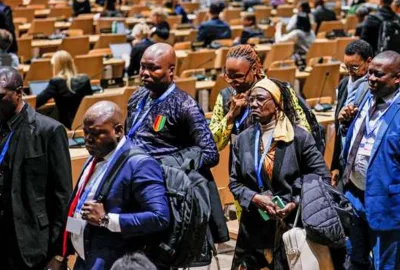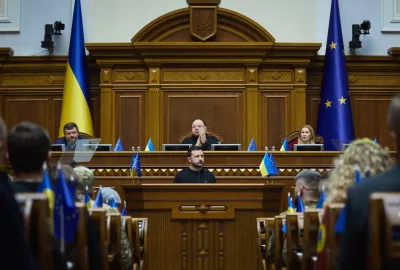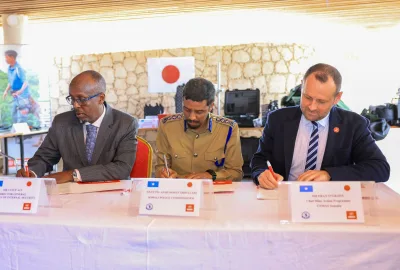Since the horrific Westgate mall terrorist attack in Nairobi in September 2013, Kenyans have been bracing…

Since the horrific Westgate mall terrorist attack in Nairobi in September 2013, Kenyans have been bracing themselves for similar attacks elsewhere. Kenya has been waging a war against the terrorist group al-Shabaab in southern Somalia since 2011, and fears have been exacerbated by the realisation that its security forces are simply not up to the task of securing the country and its borders. Kenyans are beginning to believe that they are pretty much on their own – a sentiment reinforced by President Uhuru Kenyatta himself, who advised citizens to take more responsibility for their own security rather than blame the police or the government.
Last week’s terrorist attack in Mandera, an arid border town in Kenya’s north-eastern corner, laid bare the faultlines in the country’s security and intelligence apparatus like never before. The killing of 36 quarry workers just days after the shooting of 28 bus passengers outside the town indicated that not only were terrorists freely roaming the country, but also that Kenya’s security forces may actually have helped them cross the border.
It is no secret that Mandera, a dusty outpost dominated by ethnic Somalis, has for years served as a conduit for smugglers, human traffickers and now terrorists, who cross through Kenya’s porous border by paying corrupt border police officers and administrators, quite often with the full knowledge of some of Kenya’s political elite, who are believed to benefit from it.
Even more alarming are revelations that dozens of Kenyan military recruits who were being trained to fight al-Shabaab prior to the country’s invasion of Somalia in 2011, may have defected to the terror group and are now operating within Kenya.
Meanwhile, observers are stumped by what appears to be the lack of a national security strategy. Kenya’s anti-terrorism efforts appear to be based on a counterproductive scorched-earth policy, whereby entire communities are victimised after an attack occurs. In April this year, Nairobi’s Eastleigh neighbourhood, also known as Little Mogadishu, was raided by police and military officers, and thousands of ethnic Somalis were rounded up and detained. Such “collective punishments” have also alienated the coastal Muslim population, which views the recent raids on mosques in Mombasa, which the government has accused of recruiting al-Shabaab fighters, as systematic discrimination.
Analysts believe international terror networks may be taking advantage of disenfranchised and marginalised groups in Kenya by playing on such fears. However, Kenyans’ patience is increasingly being tested by what appears to be a deliberate attempt by police to let terrorists get away with murder. In June, when heavily armed terrorists attacked and killed 65 villagers in Lamu County, Kenya’s Independent Policing Oversight Authority blamed the police for failing to heed warnings about an imminent threat and for a slow response to villagers’ cries for help. It also suggested that some Kenyan security officers may actually be helping the terrorists smuggle arms into the country.
Since then, and especially after the Mandera attacks, calls for the resignation of the inspector general of police, David Kimaiyo, and the interior cabinet secretary, Joseph Ole Lenku, have intensified. Kenyatta finally heeded these calls this week, announcing that the police chief had decided to “retire” and installing a new cabinet secretary in charge of internal security.
However, sceptics doubt that these changes will bring about the necessary reforms to security services, which suffer from corruption, a lack of professionalism and myriad other ills. No police officer has taken responsibility or been sacked for any of the attacks since Westgate.
Kenya’s security has also been compromised by the fact that for three years Kenyatta and his deputy, William Ruto, have been facing charges of crimes against humanity at the International Criminal Court related to the 2007 election. It is thought they have focused most of their attention on ensuring that they do not face trial, rather than on the nation’s priorities. Now that the ICC has withdrawn the charges, largely because many witnesses disappeared or refused to testify, it is hoped that the president will focus his attention on the many pressing challenges facing the country.
Unfortunately, all these deficiencies are being exploited by al-Shabaab. Neighbouring Uganda, Ethiopia and Burundi – all of whom have their boots in Somalia as part of African Union forces, of which Kenya is also a part – have not suffered from as many terrorist attacks as Kenya. This points to a rotten and highly corruptible security system – in a country that was once an oasis of peace in a conflict-ridden region.
However, it is doubtful if Kenyatta will be able to kill the corruption dragon that has been eating away at the country for decades. Kenyans are slowly realising that endemic corruption is costing them their lives. A bombshell report by the public accounts committee, whose findings were published by Kenya’s Business Daily last week, has revealed that millions of dollars from the internal security ministry were diverted to a secret “slush fund” between July 2012 and March 2013.
The lessons many citizens draw from this is that, although a reshuffle and a better anti-terrorism strategy may improve security in the short term, as long as there is a police officer or a public official who is willing to accept a bribe from a terrorist or divert public funds allocated to security, no Kenyan is safe.
Source: The Guardian







